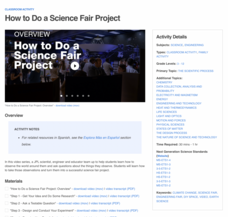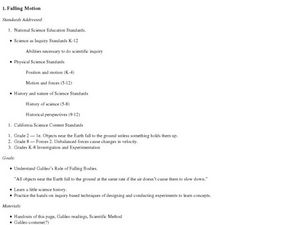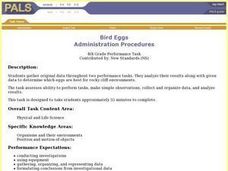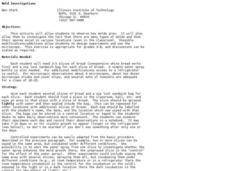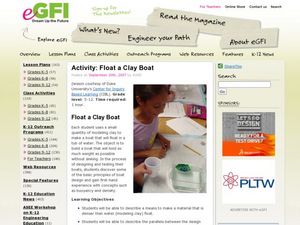American Psychological Association
Do Cookies/Donuts Improve Memory? Errors in Methodology
If the methodology is skewed, the results will be skewed. That's the takeaway from an exercise designed to get class members thinking about research methods and statistics gathering. Instructors manipulate the testing environment to...
Bonneville
Setting Expectations for Science and Engineering Projects
What is science? Sitting in a whole group discussion, scholars first share their ideas on science and how to conduct investigations. They learn about the steps for scientific inquiry and experimentation. Once finished, individuals then...
NASA
How to Do a Science Fair Project
Build problem-solving skills with science! Step-by-step videos walk investigators through each stage of completing a science fair project. Scientists learn to formulate a testable question, design an experiment, collect data, draw...
PBS
Breaking Point
Leaf toughness can add to its herbivore appeal. Learns design an experiment to quantify leaf toughness and then perform their procedures. They follow the experiment with a set of questions that ask them to think about how leaf toughness...
Wilderness Classroom
Pollution
Educate scholars on pollution—air, water, and land—with a series of lessons that begin with a thorough explanation of each type. Learners then take part in three activities to reinforce the importance of reducing pollution. They...
Curated OER
Density and Buoyancy Experimental Design
Students must plan, design, and conduct an experiment that answers the scientific question: "Come up with a question that addresses the factors (variables) of the water and its effect on whether an object floats or sinks."
Curated OER
And the Survey Says...
Eighth graders evaluate whether a certain argument is valid or invalid. In this science instructional activity, 8th graders discuss the importance of using unbiased evidence. They design an experiment that they can test in school.
Curated OER
Falling Motion
Students design and conduct an experiment on Galileo's Rule of Falling Bodies. In this physics lesson, students collect and analyze data. They create a presentation and share it with the class.
Curated OER
Measuring the Flagpole
Studets practice problem solving and comparison of quantities, ratios and prproportions. They develop a plan for determining the height of a flagpole complete with drawings and calculations. In addition, they complete a written...
PBS
Predicting/Making a Hypothesis
Students analyze information from a variety of sources in order to create a hypothesis about the origin of an interesting family artifact.They create alternative hypotheses based upon available information to demonstrate that some...
Curated OER
Introduction to Chemistry
In this introduction to chemistry worksheet, students answer 9 questions regarding the study of chemistry. The first part is matching, then they "think like a scientist" and then they problem solve.
Curated OER
Invent on the Spot
The best inventions come from a problem that needs to be solved! Given a container with holes in...
Curated OER
Bird Eggs
Learners perform an experiment with different types of bird eggs to determine what factors make them strong and able to stay on a cliff without rolling off.
Curated OER
Color Dots 2
Students develop simple observations. They observe bleeding of colored inks with water, to understand mixtures, and to make generalized inferences from their observations.
Curated OER
Foodborne Illness Outbreak Investigation
Students demonstrate how epidemiological investigations of outbreaks are performed. They illustrate the principles of hypothesis formation and testing by epidemiologic study in the setting of an acute foodborne disease outbreak.
Curated OER
Non-Compressibility of Water
Students will observe a property of water. In this inquiry-based properties of air lesson, students observe how a change in water pressure impacts the positioning of an eye-dropper in the water container and they make hypotheses about...
Curated OER
Mold Investigations
Students observe mold growth on bread. In this mold growth lesson, students place bread in various locations and in various conditions to investigate how location, moisture, temperature, and other variable impact the growth of mold on...
Curated OER
The Phantom of the Computer Lab
Young scholars calculate the power consumption of computers in school. In this physics lesson, students design an experiment to determine whether the school should unplug computers at the end of the day. They collect data and report...
Curated OER
Chapter 1 Guided Notes: The Science of Biology
Specifically designed as a textbook reading guide, this activity may not apply to your biology course. It asks participants to list characteristics of life and the hierarchical organization levels. It vaguely deals with scientific...
Curated OER
Activity: Float a Clay Boat
Written to introduce pupils to buoyancy, this activity has collaborative groups work to design a floatable clay boat. They first observe that a stick of clay sinks in water and then are given their own stick to reshape into a floating...
Curated OER
Math and Science in a Wetland
Students use scientific methods during field and lab investigations. Students collect specimens and make measurements using the metric system. Students describe biotic and abiotic factors in an estuary and design a model.
Curated OER
Munching Insects
Students design an experiment to discover what types of plants particular insects prefer. They comprehend that insects eat only specific plants and that this has particular implications for noxious weeds. Students observe and collect...
Curated OER
The Importance of Making Labs a Priority
The benefits of inquiry-based exploration can be attained in any classroom.
Curated OER
Drinking Water and Water Purification
Sixth graders design experiments to compare the amount of bacteria in river water to the amount in purified tap water. They explore how water purification removes bacteria and pollution from the water. Students examine the steps of the...


